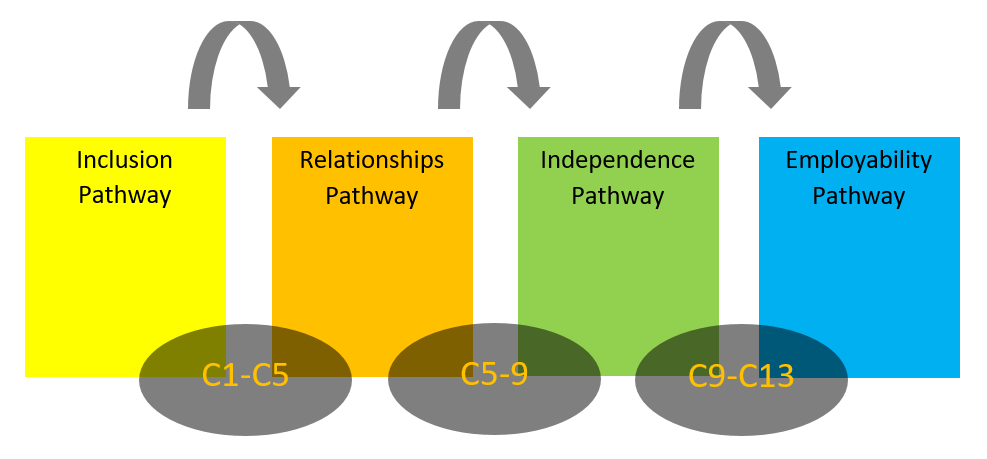Our phone number has changed to 0161 850 2900
Pathway Descriptors
Intent:
At Chatsworth High School and Community College we believe that every pupil should be provided with an educational framework that enables them to learn, thrive and reach their full potential.
Whilst each learner follows a rich and varied curriculum and has their own bespoke and personalised targets, they are also supported to reach their aspirations by the pathway they follow. These pathways allow students to explore learning and develop skills in line with their goals and aspirations.
Implementation:
The pathway a learner follows informs the targets they are set and the way in which the core curriculum is delivered. Allocation of a pathway takes a holistic approach, considering information from the Education, Health and Care Plan, parent/carer wishes, baseline and ongoing assessment and of course the goals of the learner. As learners develop there is also room for internal progression between pathways. Progress is a measured using a combination of personal targets and subject learning outcomes, as well as ASDAN, AQA and Open Awards qualifications as appropriate.
Expected Impact:
Learners will develop knowledge that is appropriate to their aspirations and expected destinations, be that at the end of a key stage, when they transition to college/independence services or as they prepare for adulthood. Students will be equipped with skills that support the next stage of their development and ultimately those they need to live successful and happy lives.
Please see below for more specific information about each of our learner pathways:
|
Inclusion Pathway |
|
Students on the Inclusion pathway develop skills to support them to effectively interact with the world around them. Emphasis is placed on developing core skills through a rich and varied curriculum. Learners participate in all curriculum subjects in a sensory manner, exploring their environments in a safe and supportive way. There is a focus on structure and consistent repetition of key skills, along with the sequencing of small steps of learning to facilitate the consolidation of learning. Learners develop their abilities to use appropriate, personalised augmentative and alternative means of communication in all areas of the curriculum. |
|
Relationships Pathway |
|
The Relationships pathway places emphasis on the social- and life skills which support students to build effective relationships with others. Learners develop knowledge of their various social and community circles, and begin to identify what behaviours are appropriate with whom and how to keep themselves safe with different people and in various environments. There is a focus on structure and positive behaviour support, which facilitates the development of positive behaviour strategies and subsequently more independent self-regulation. Learners will be appropriately assessed for augmentative and alternative communication strategies as necessary to engage with their learning and those around them. |
|
Independence Pathway |
|
Learners studying on the Independence pathway focus on developing their life- and self-help skills to enable them to live their life, both now and in the future, as independently as possible. Central to this are subjects such as Cooking, Home Management, Community Living and PSHE. Here students develop skills to support personal- and self-care, health & safety and home-care, as well as exploring and establishing their place in their communities. Students will focus on functional skills, social enterprise, health, friendships and relationships. Learners’ individualised communication strategies will embedded throughout all learning. Personalised internal work placements will be undertaken as appropriate. |
|
Employability Pathway |
|
On the employability pathway learners engage with the world of work in a variety of ways. The focus of study will depend upon a student’s key stage. Younger learners will develop their understanding of the meaning of work, different industries and job roles, before beginning to consider their own skills and preferences in relation to job roles that may be suitable for them. Older students will begin encountering roles in different sectors, such as catering, hospitality, horticulture, retail and administration in preparation for their move to college and transition to adulthood. Learners will participate in age appropriate social- and mini-enterprises to support the development of their social and emotional and functional skills, resilience and workplace communication and behaviour skills. Personalised internal and external work placements will be undertaken as appropriate. |

